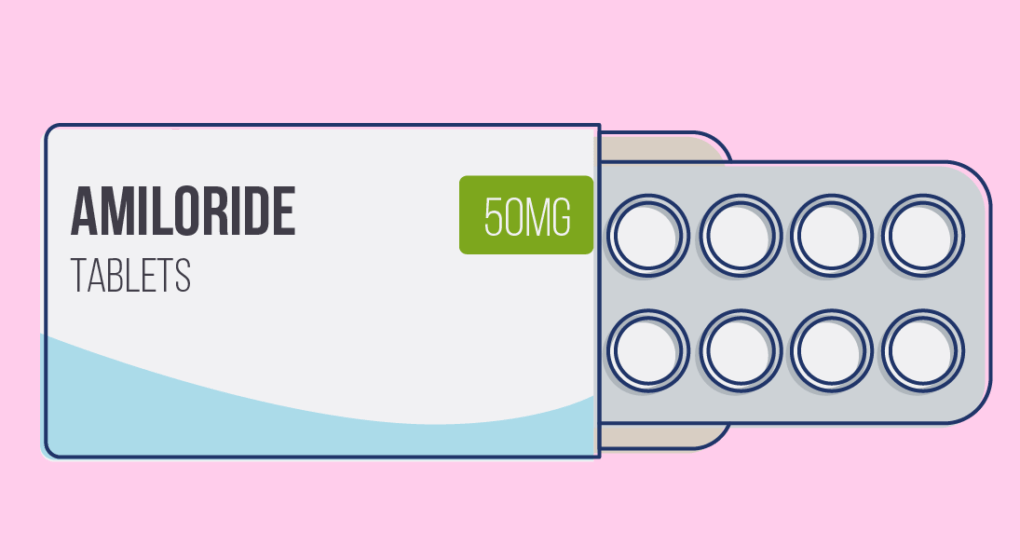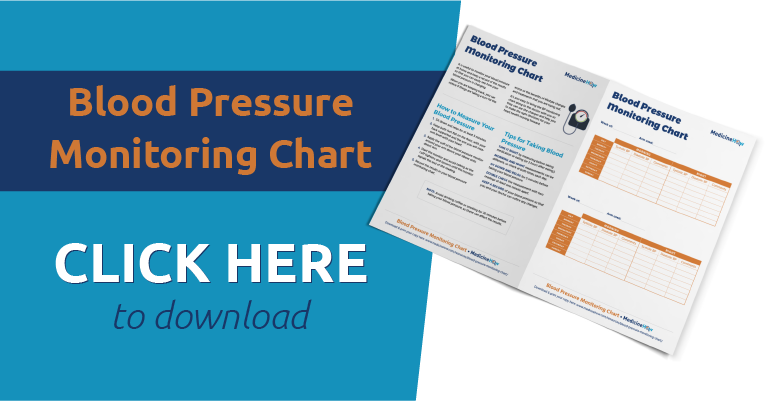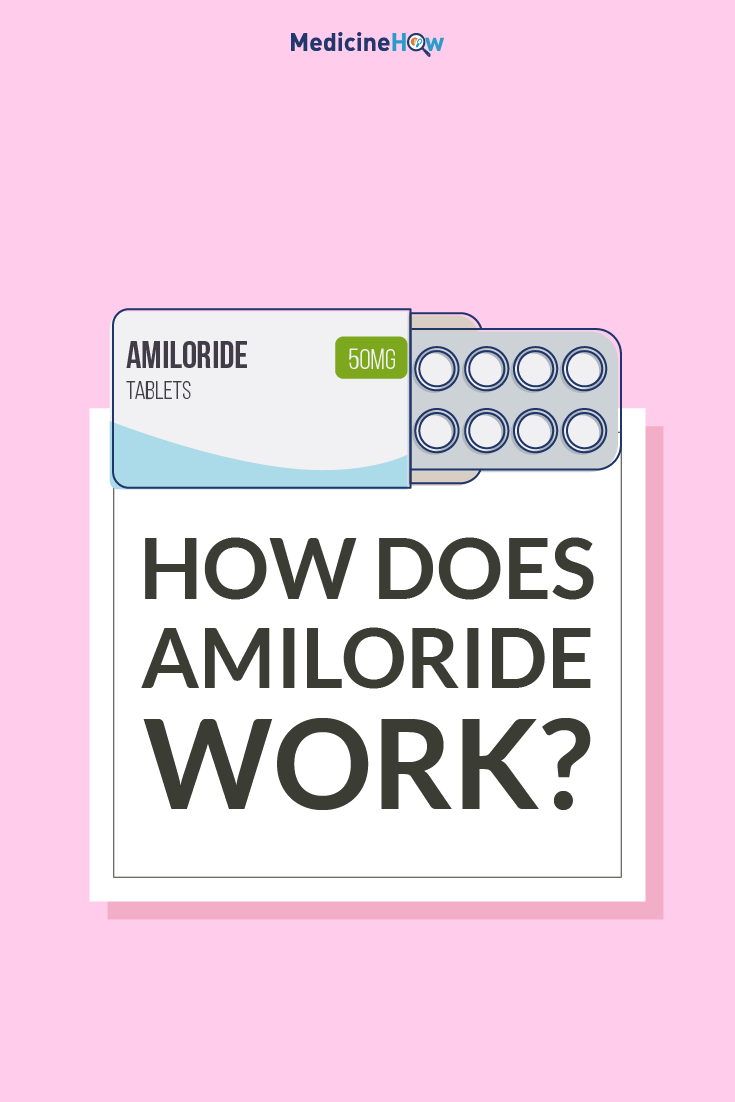
Amiloride is a type of drug called a potassium-sparing diuretic, which works by blocking the sodium channels in the distal tubule of the nephrons in the kidney to reduce the excretion of potassium in the urine. This is useful to prevent the build-up of potassium in the blood that can occur with the use of other diuretics, such as thiazide diuretics, when treating hypertension or oedema.
Brand Names and Doses
![]() Amiloride is the generic name – the active drug found in the medication. The brand name of the medication that contains amiloride is Kaluril, which is available in a single dose of 5 mg (but the tablets can be split in half if you need a lower dose of 2.5 mg).
Amiloride is the generic name – the active drug found in the medication. The brand name of the medication that contains amiloride is Kaluril, which is available in a single dose of 5 mg (but the tablets can be split in half if you need a lower dose of 2.5 mg).
Amiloride is also available in a combination product with hydrochlorothiazide, under the brand name Moduretic with 5mg amiloride and 50 mg of hydrochlorothiazide.

What type of drug is it?
![]() Amiloride is a type of drug called a potassium-sparing diuretic. Other drugs in the same class that work in a similar way are:
Amiloride is a type of drug called a potassium-sparing diuretic. Other drugs in the same class that work in a similar way are:
However, even though these drugs have a similar mechanism of action, they have different purposes in treatment and amiloride is the only potassium-sparing diuretic that is used as a stand-alone medication for hypertension.
How does Amiloride work?
![]() Amiloride changes the production of urine in your body by blocking sodium channels in a part of the nephrons called the distal tubule in the kidneys, increasing the excretion of sodium and fluid. Unlike other types of diuretics, more potassium is not excreted in the urine – it’s because of this that it can balance the side effect of low potassium levels (hypokalemia) of other diuretics used to treat hypertension and oedema.
Amiloride changes the production of urine in your body by blocking sodium channels in a part of the nephrons called the distal tubule in the kidneys, increasing the excretion of sodium and fluid. Unlike other types of diuretics, more potassium is not excreted in the urine – it’s because of this that it can balance the side effect of low potassium levels (hypokalemia) of other diuretics used to treat hypertension and oedema.
In fact, its effect to treat these conditions is very mild and it is most often recommended in combination with other types of medications to balance the levels of potassium in the bloodstream.
Side Effects
![]() Amiloride has a range of effects on the body, which can lead to side effects in some people.
Amiloride has a range of effects on the body, which can lead to side effects in some people.
The main action is to increase the concentration of potassium in the blood because it prevents it from being excreted in the urine. But, as a result, the levels of potassium can sometimes become too high and lead to hyperkalemia. This is particularly common if you take it with other drugs that increase the concentration of potassium in the body, such as ACE inhibitors or angiotensin II blockers.
It can also upset other salts in the body and cause low sodium levels (hyponatremia) and low chlorine levels (hypochloremia). If you’d like to check that your levels are normal, you can ask for a blood test from your doctor.
You may also notice a range of other effects such as:
- Weakness
- Headache
- Nausea
- Vomiting Constipation
- Dizziness
- Muscle cramps
- Frequent urination
- Abnormal glucose levels
For the full list, you should see the medicine information leaflet.
Cautions
![]() There are a few people who should be careful when taking amiloride, or it may be recommended to avoid the drug altogether in some cases.
There are a few people who should be careful when taking amiloride, or it may be recommended to avoid the drug altogether in some cases.
Hyperkalaemia: The main issue with taking amiloride is your current level of potassium. If you already have high levels of potassium, it doesn’t make sense for you to take amiloride because the action of the drug is going to make it go up even more.
Renal Impairment: If you have weak kidneys or poor renal function, you are at increased risk of excessively high potassium levels if you take amiloride. For this reason, another drug is likely to be a better option.
Drug Interactions
![]() Amiloride can sometimes interact with other medications that you may be taking, including:
Amiloride can sometimes interact with other medications that you may be taking, including:
ACE Inhibitors + Amiloride Interaction
Both of these drugs increase the concentration of potassium and if you take them together there is a high risk of hyperkalemia.
Sartans + Amiloride Interaction
Both of these drugs can increase the concentration of potassium and if you take them together there is a high risk of hyperkalemia.
NSAID + Amiloride Interaction
Both these drugs can increase the concentration of potassium and if you take them together there is a high risk of hyperkalemia.

Pregnancy and Breastfeeding
![]() Amiloride should not be used by women who are pregnant or planning to become pregnant, as it may upset the balance of salts in the blood and cause harm to the baby.
Amiloride should not be used by women who are pregnant or planning to become pregnant, as it may upset the balance of salts in the blood and cause harm to the baby.
It can be taken while breastfeeding but there is not a lot of research to support its complete safe use and it may also suppress lactation and decrease milk production.
Pin it!


